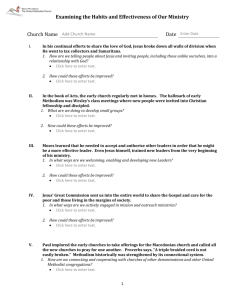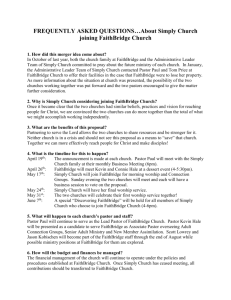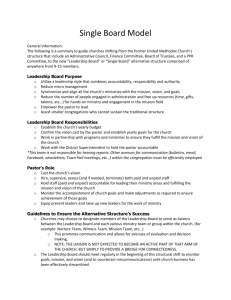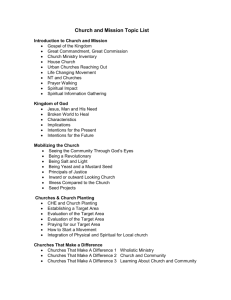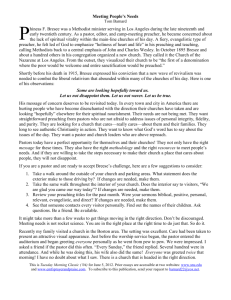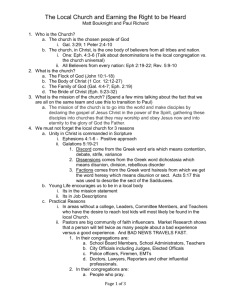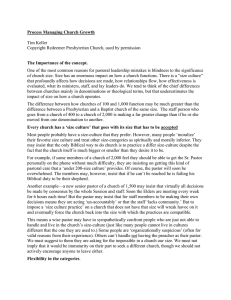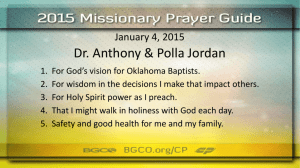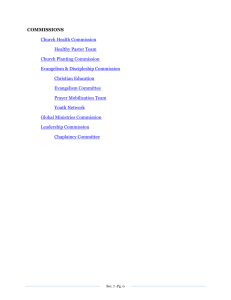Permission Giving Interview with Bill Easum
advertisement
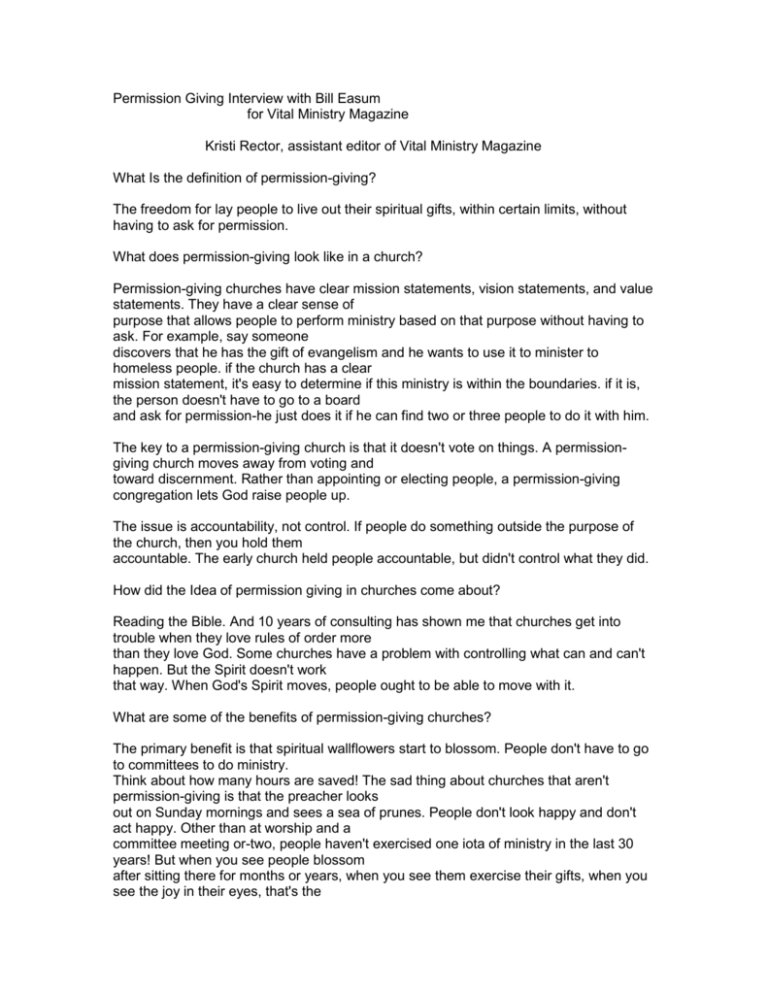
Permission Giving Interview with Bill Easum for Vital Ministry Magazine Kristi Rector, assistant editor of Vital Ministry Magazine What Is the definition of permission-giving? The freedom for lay people to live out their spiritual gifts, within certain limits, without having to ask for permission. What does permission-giving look like in a church? Permission-giving churches have clear mission statements, vision statements, and value statements. They have a clear sense of purpose that allows people to perform ministry based on that purpose without having to ask. For example, say someone discovers that he has the gift of evangelism and he wants to use it to minister to homeless people. if the church has a clear mission statement, it's easy to determine if this ministry is within the boundaries. if it is, the person doesn't have to go to a board and ask for permission-he just does it if he can find two or three people to do it with him. The key to a permission-giving church is that it doesn't vote on things. A permissiongiving church moves away from voting and toward discernment. Rather than appointing or electing people, a permission-giving congregation lets God raise people up. The issue is accountability, not control. If people do something outside the purpose of the church, then you hold them accountable. The early church held people accountable, but didn't control what they did. How did the Idea of permission giving in churches come about? Reading the Bible. And 10 years of consulting has shown me that churches get into trouble when they love rules of order more than they love God. Some churches have a problem with controlling what can and can't happen. But the Spirit doesn't work that way. When God's Spirit moves, people ought to be able to move with it. What are some of the benefits of permission-giving churches? The primary benefit is that spiritual wallflowers start to blossom. People don't have to go to committees to do ministry. Think about how many hours are saved! The sad thing about churches that aren't permission-giving is that the preacher looks out on Sunday mornings and sees a sea of prunes. People don't look happy and don't act happy. Other than at worship and a committee meeting or-two, people haven't exercised one iota of ministry in the last 30 years! But when you see people blossom after sitting there for months or years, when you see them exercise their gifts, when you see the joy in their eyes, that's the benefit. it's also biblical. Clergy aren't supposed to be the exclusive representatives of God to the people. People are supposed to represent God to one another How does decision making change in a permission-giving church? A Very few decisions are made. There's not much voting; it's discernment. My studies show that 94 percent of the time most churches spend go hours and 45 people's time to vote no on an idea. in a permissiongiving church the only question is, does an idea for ministry match, enhance, or fulfill the church's mission statement? If it does, go for it. Can you give an example of a church using permission-giving? The best one I can think of is Christ United Methodist in Fort Lauderdale, Florida. it was declining for 30 years. When it moved into a permission-giving model based on three core values, it grew from 900 to 1,600 in attendance in two years. They have 100 lay pastors who've never been voted on or elected. Everything is measured according to three core values. if something doesn't match one of the values, they won't do it. Lay people choose to lead a ministry. For example, one man felt God's leading to start a homeless ministry. He came to the pastor, who said, "That fits our third core value (to relieve suffering). if you want to do it, find two or three people to do it with you and go for it." In less than two years, they were the second-largest provider of shelter to homeless in that county because one man felt led and he went to cast his vision. How do people in the church typically react to this model? Churches have to agree to move into this model. You can't use it in a traditional, votingbased congregation. It takes major transformation and the dropping of most existing structure. It takes trust and mutual respect for one another. Usually, pastors spend a year or two laying a foundation, casting a vision, getting people acquainted or reacquainted with the Scriptures. Soon they start giving a little permission here and there, saying, "Just try it and see how it works. Don't take it to the worship committee or the social committee. See if other people are interested in it, and just go do it, Then come talk to me. We'll get a little success under our belt, and then we'll go to the board and let them see it." Over time, if you give enough permission, others will see that people desire to serve others in a way that makes a difference. A permission giving church makes a commitment to see in people what God sees in them that they haven't seen in themselves, helps them discover it, and then gets out of their way. Most people in the church have a desire to serve others. But churches typically have a handful of meanspirited people. Permission-giving churches are willing to take on mean-spirited people and change them or kick them out. You can't live with cancer in the body. Most churches have about one percent that is really a cancer. These people don't act like Christ, and they shouldn't be in the church. Do pastors of permission giving churches feel they're losing control? Always. But how do you control the Spirit? Two things have to' happen: Pastors have to give up control of the ministry, and lay people have to give up control of the administration. In the Bible, every time the Holy Spirit moves, there's chaos and turbulence. People willing to leave the sanctity and the safety of the upper room will find themselves in the chaos of what's out in the streets. But that's where people are transformed and lives are changed. Very few people are nurtured or converted in a committee meeting! Is It possible for a pastor to Implement this without creating anarchy in the church? Among 80 to 90 percent of the people, yes. Of the other 10 to 20 percent, three percent will see it as anarchy. others will see it as confusion. But that's the world we're in. God doesn't work neat and orderly But it's not really anarchy. it's freedom! And when you give people freedom in the Spirit, they don't all look, smell, and think alike, but they're about the same mission and cause. Take the 12 disciples. They didn't look alike. They had different backgrounds. But one common cause held them together-Jesus. A permission-giving pastor is like a spiritual midwife who permits an environment where other people are encouraged to give birth. And at the moment of worst pain, the pastor hollers, "Push!" The permission-giving pastor goes around like a midwifecleaning up messes, cutting the cord, giving the baby back, moving away, and watching it blossom and grow and flourish. The permission-giving pastor is a freedom-giver and change-encourager. The Bible is a book of change. People who are afraid of change have lost their love. They need to get closer to Christ because he's a bundle of change. People's lives are turned upside down. It's called radical faith. Return to Index

